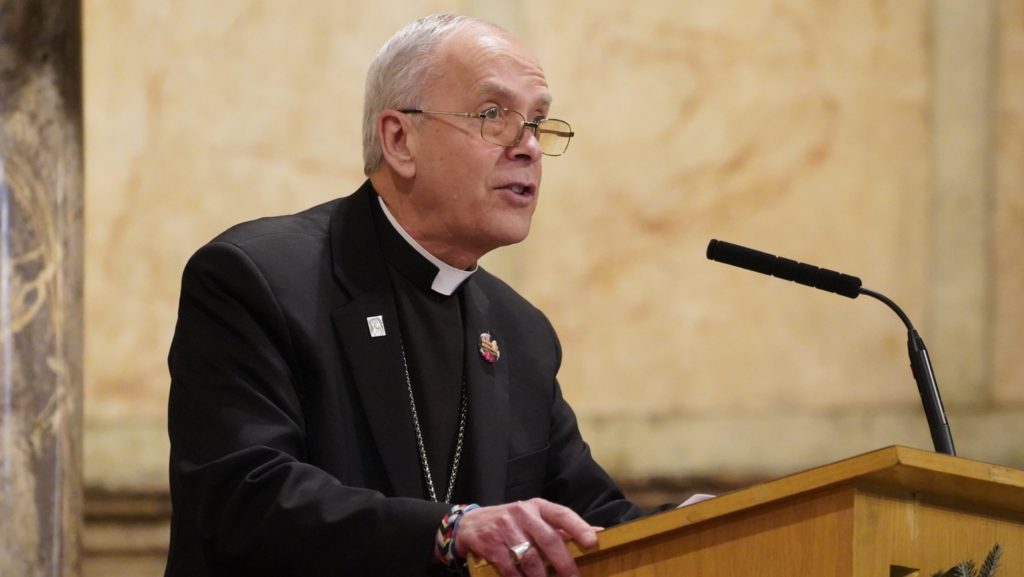Calling Vice President JD Vance’s “bottom line” comments a “tremendous mischaracterization,” Bishop Mark Seitz of El Paso has said that “[Vance] clearly doesn’t know me. He doesn’t know my heart,” while also offering a sit-down conversation.
“I would love to sit down sometime with Vice President Vance and talk to him about these issues in regard to our resettlement work and things like that, because he clearly has been misinformed, and that’s so unfortunate, and when it comes from a person who has a loud megaphone right now it can be very, very harmful to this work of the Church to very vulnerable people,” said Seitz, chairman of the United States Conference of Catholic Bishops Committee on Migration. “So it is really concerning.”
Vance, a Catholic convert, made the comments on a recent edition of CBS’s Sunday news program Face the Nation, citing the millions the U.S. bishops receive from the federal government to resettle refugees and questioning, “are they worried about humanitarian concerns? Or are they actually worried about their bottom line?”
The comment was met with a swift response from the USCCB, defending its work. As Vance suggested, the conference received in excess of $100 million from the federal government as a resettlement contractor in both 2022 and 2023, according to the conference’s published financials. However, records indicate that in each year the conference actually spent more than it received from the federal government on its refugee resettlement efforts, making Vance’s comment a bit of a misnomer.
Speaking at a Georgetown University Initiative on Catholic Social Thought and Public Life dialogue on Feb. 12, Seitz also spoke on the prejudice that has been enabled in the “current situation,” referring to the rhetoric of the Trump administration and other political leaders.
“The rhetoric from leaders opens the door because it doesn’t distinguish,” he said. “It calls all immigrants criminals, rather than criminals, criminals … and that allows many to hear that at least and say, ‘if the person is brown, you know, they’re bad.’”
As the Trump administration has targeted migrants who have committed crimes in the first phase of its mass deportation efforts – of which they’ve already detained and deported thousands –, Seitz also questioned the responsibility the country has to rehabilitate those individuals instead of deporting them.
“Is it really OK to say these people are so bad we’re going to ship them to Guantanamo Bay and forget about them without a trial, without even a due process, much less an effort to rehabilitate them?,” he asked. “And frankly, if you want to look from the standpoint of self interest, you’re not fulfilling self interest either when you’re putting people in a situation where they’re constantly made worse than they were before because of the way they were incarcerated.”
Pope Francis’s recent letter to the U.S. bishops on immigration, where he criticizes the Trump administration’s mass deportation plans only came up briefly during the dialogue, with Seitz simply saying the pontiff “has once again come forward and spoken in a certain way on our behalf, with an eloquence that few of us can.”
Throughout the dialogue, Seitz, and other participants, highlighted the fear the Trump administration’s policies and rhetoric on immigration have created. Seitz spoke of the traumatization many migrants experience in their home countries that force them to flee, and that they experience on their journey, noting that many of them now feel forced to go back to those situations.
He told the story of a man named Jesus, who is in his mid-20s, and how after a Mass last week he spoke before the entire congregation, thanking them for the warmth they have showed him, and letting them know that because he has lost his parole “he wasn’t going to stay in the midst of the fear that they now have in the immigrant community.”
“That kind of story is being repeated throughout the immigrant community,” Seitz said. “Not everyone is choosing to leave, but many of them are saying, ‘as bad as it was at home, as much as I was in fear of my life at home, I just can’t live like this.’”

